This post contains affiliate links.
Hummingbird feeder maintenance is crucial when attracting hummingbirds to your garden. Having a pristine feeder not only looks healthy, but protects your visitors from catching diseases.
In this article, I will dive into the importance of cleanliness of hummingbird feeders, the potential consequences of neglecting hygiene, and effective tips for keeping your feeder sparkling clean. Join me as I explore whether hummingbirds will drink from a dirty feeder and learn how to ensure your feathered friends have a safe and nutritious dining experience.
Creating a Hummingbird Garden: Will Dirty Feeders Affect Your Visiting Hummingbirds?
Creating a thriving hummingbird garden is a delightful pursuit for many enthusiasts and provides a vibrant spectacle as these aerial jewels flit from flower to flower.
To truly attract hummingbirds and ensure they become regular visitors, maintaining clean hummingbird feeders is paramount. Unfortunately, while hummingbirds will eagerly seek out sources of nutritious nectar, dirty feeders can become a deterrent, causing them to seek sustenance elsewhere.
For avid birdwatchers, understanding that a dirty feeder has severe repercussions on the health and safety of hummingbirds is a serious concern. Feeders harbor harmful bacteria and mold when not properly maintained, leading to potential disease transmission amongst the visiting hummingbirds.
Read my article: What is the Black Stuff on my Hummingbird Feeder?
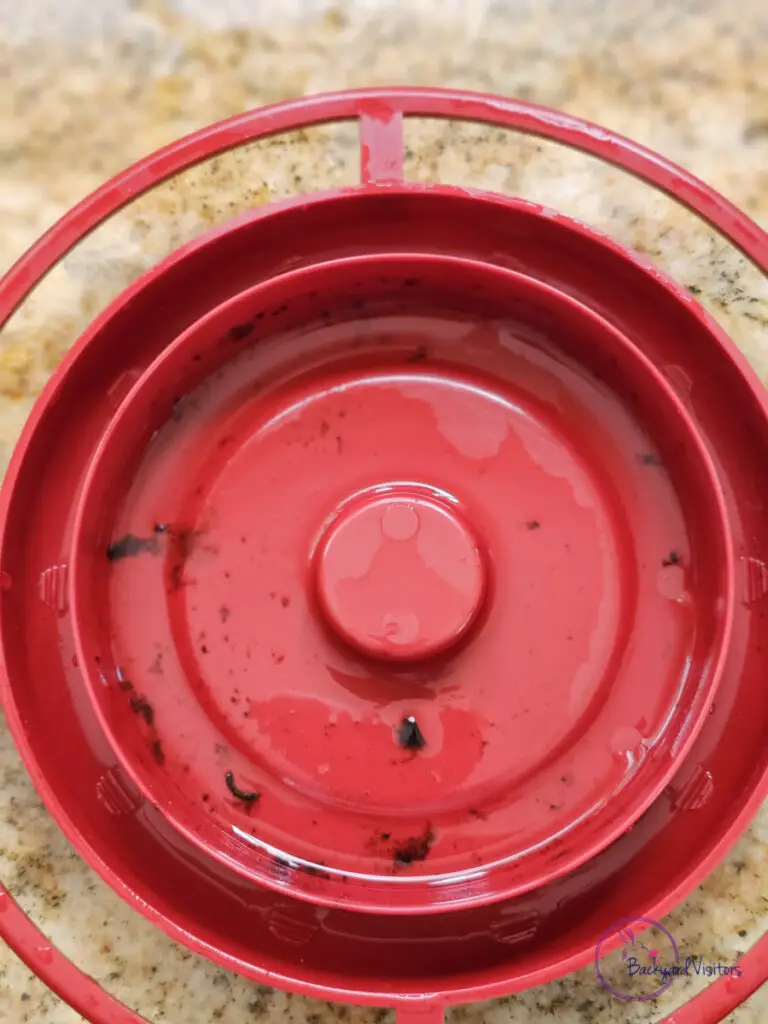
This risk underscores why many hummers will avoid coming back to such a feeder if the nectar is not consistently fresh and the feeder is not regularly cleaned.
When designing your hummingbird garden, incorporate feeders that are not only visually appealing but also are easy to disassemble and clean, making the task less daunting. Moreover, the effort you put into ensuring that feeder hygiene is upheld will be rewarded tenfold, as vibrant hummingbirds buzz and dance around your garden, bringing it to life.
Remember, while the delicate dance of these creatures around flowers is enchanting, a hummingbird feeder will serve as an excellent additional food source, especially during periods when natural food sources are scarce.
Hummingbird feeders should be emptied and cleaned at least once a week, but in warmer climates or during times of high usage, this routine should be increased.
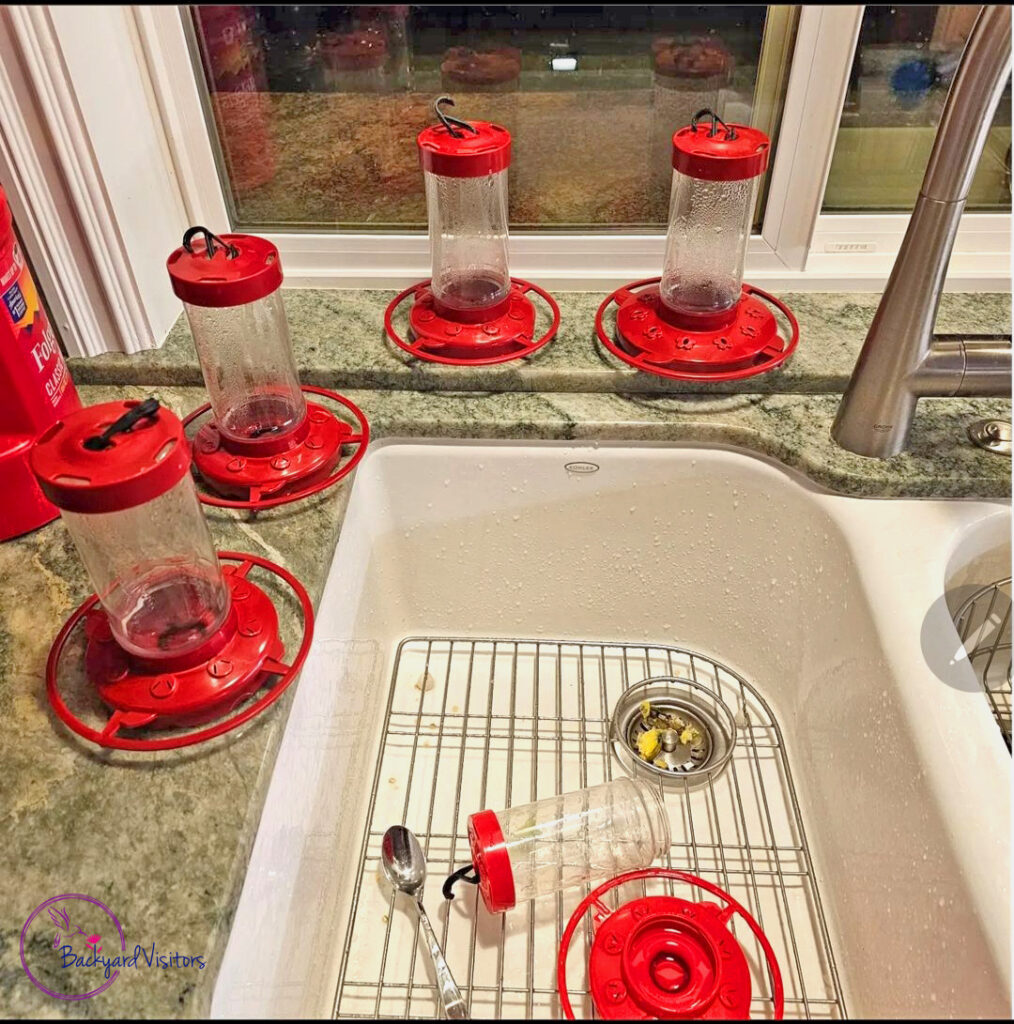
Using warm water and a bottle brush, followed by a thorough rinse, will be enough to clean the feeder. For a deep clean, some say a solution of one part bleach to nine parts water is necessary, however I believe bleach is too harsh for cleaning hummingbird feeders. I recommend using a solution of one part white vinegar with four parts water, scrubbing with a bottle brush to clean all the places where mold or residue can accumulate, and thoroughly rinse.
The vinegar solution is a natural and safe way to clean your hummingbird feeder, ensuring a healthy environment for the birds to enjoy their nectar. Never use apple cider vinegar, soap or bleach when cleaning your hummingbird feeder.
To coax a diversity of hummingbirds into your oasis, offer multiple feeders, spacing them out to reduce territorial disputes. Even if a feeder does not appear dirty, clean and change the nectar.
after 5 days.
Since hummingbirds have incredible memories, if a hummingbird recognizes and associates a feeder as having unsuitable nectar and is dangerous it may be leary of attempting visiting your feeder even after the issue is resolved.
Hummingbirds are drawn to feeders and also to gardens that provide a variety of blooms. Supplement your feeders with native flowers, shrubs, and trees known to attract hummingbirds. This approach not only offers them natural food options but also nesting sites and perches—creating a more holistic environment tailored to their needs.
Read my article: Attracting Hummingbirds: Do Hummingbirds Prefer Flowers or Feeders?
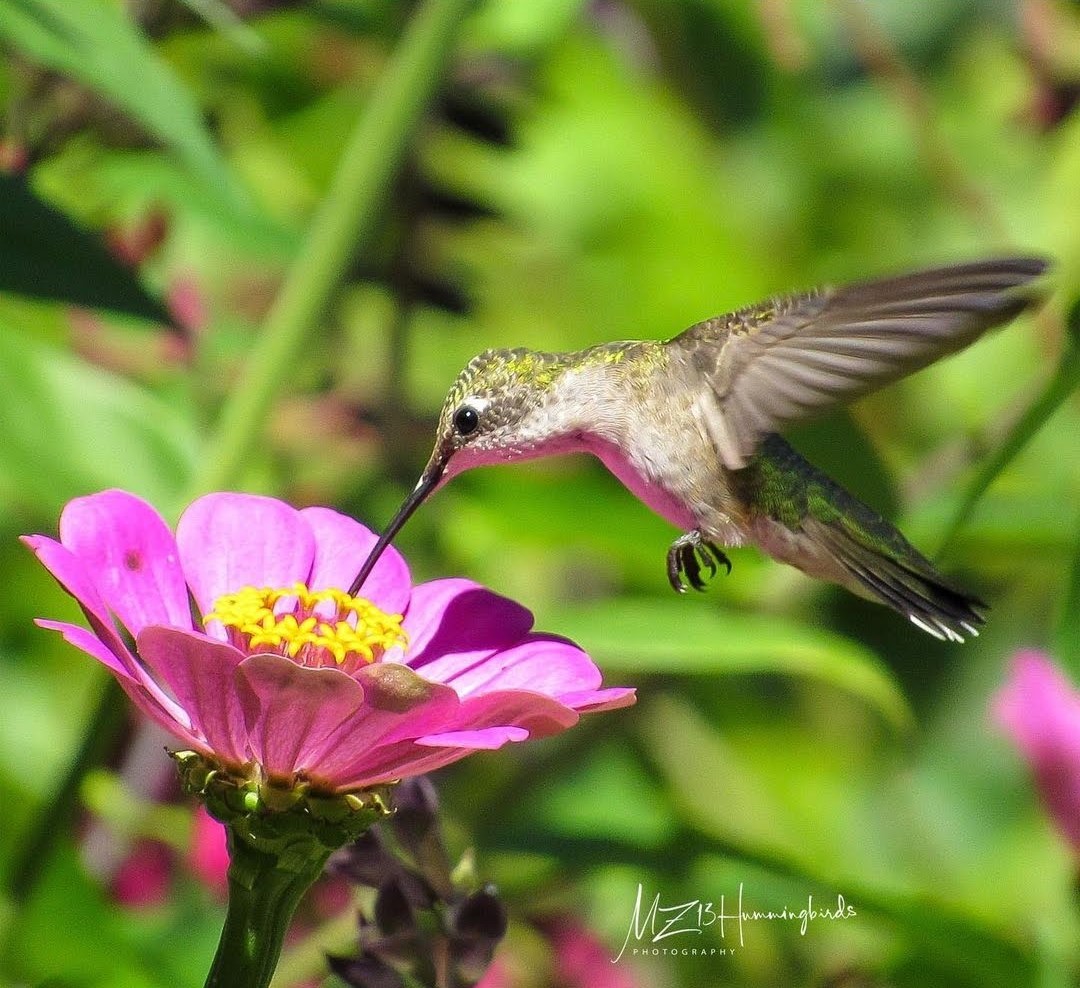
Zinnia Plant
Photo by: Mz13hummingbirds
A clean feeder in a well-curated garden becomes a hummingbird’s paradise. Regularly maintaining your hummingbird feeders and planting an assortment of flowers will keep these iridescent birds coming back for more.
Do not be surprised if, with due diligence, your garden becomes the talk of the neighborhood, not only among the hummingbirds but also among fellow hummingbird enthusiasts eager to catch a glimpse of the action. Remember, cleanliness will ensure that your hummingbird garden remains a bustling hub for these tiny wonders, preserving the magic season after season.
Feeder Safety and Feeding Hummingbirds: The Impact of Clean Feeders on Hummingbird Health
Feeding hummingbirds is a delight that brings vibrant life to your garden. Feeder safety should never be overlooked. Hummingbird feeders become hubs of activity, where these tiny birds replenish their energy reserves.
Regularly offer fresh hummingbird nectar in clean hummingbird feeders to demonstrate your commitment to their well-being. By ensuring that feeders remain free from mold, bacteria, and fermented nectar, you are actively preventing the spread of diseases that will give these birds deadly bacterial and fungal infections. These infections will quickly spread through the hummingbird population, especially when multiple hummingbirds visit the same feeder.
Read my article: Hummingbird Diseases: From Pathogens to Prevention
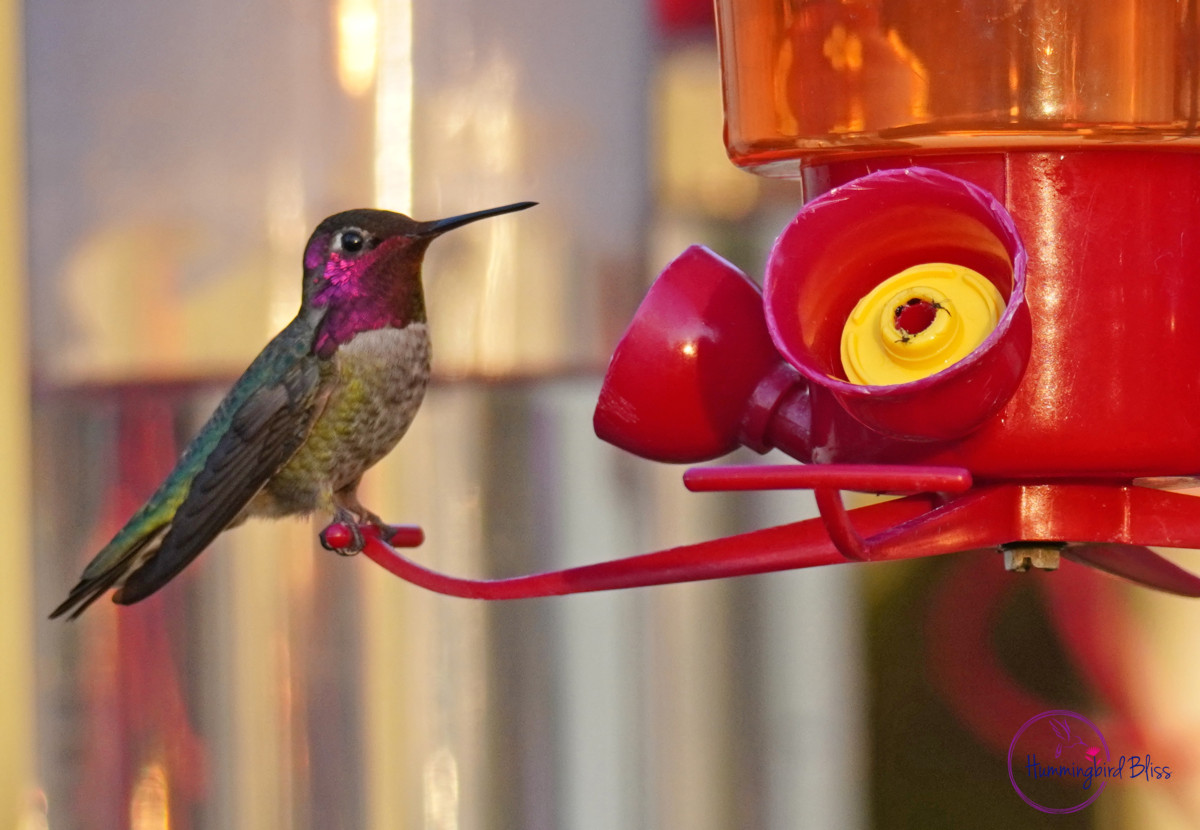
It is essential to understand that hummingbirds will get sick or even die from drinking out of dirty feeders, making clean feeders not just a preference but a necessity.
Regular maintenance ensures that the nectar does not become a breeding ground for harmful pathogens. The simple act of maintaining a clean feeder is a critical aspect of responsible hummingbird care.
Therefore, if you truly appreciate the presence of hummingbirds and are invested in feeding hummingbirds, always prioritize their health by keeping feeders impeccably clean.
A dirty feeder is a health hazard and discourages hummingbirds from returning. These discerning creatures are put off by the sight and smell of neglect, and they will seek out alternatives to feed safely.
Consistently maintaining clean feeders will keep the trust of these delightful birds, ensuring they continue to grace your garden. They are more likely to become regular visitors, which adds a magical quality to your outdoor spaces.
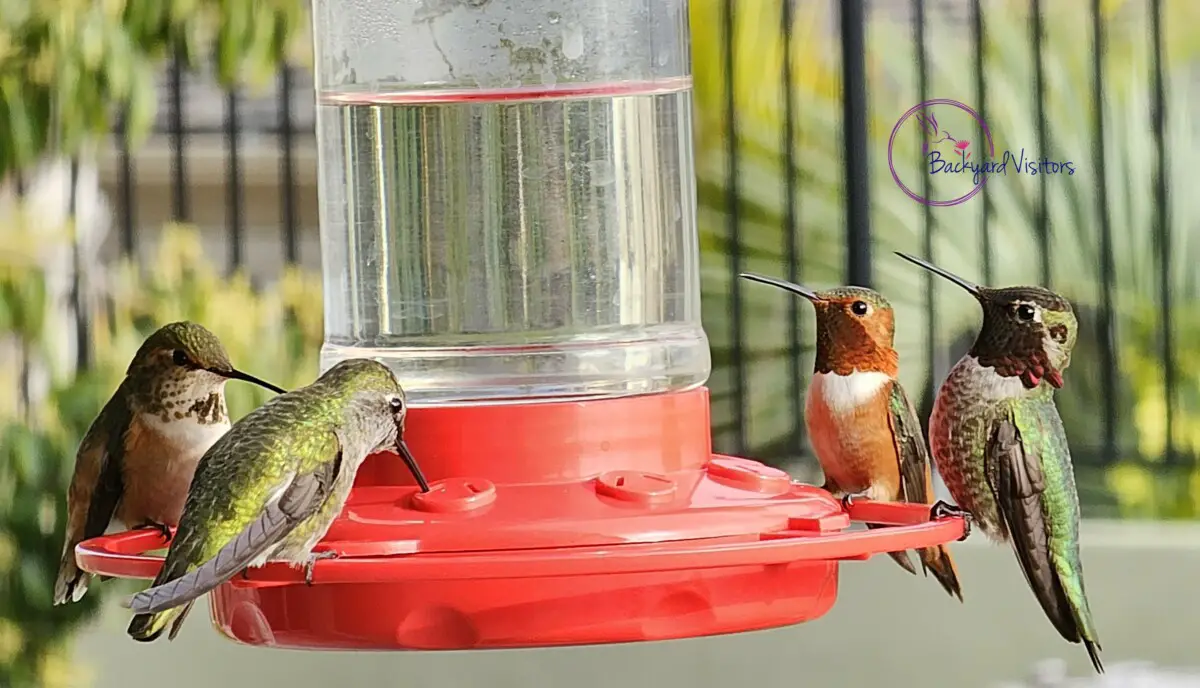
In case you are wondering, “Can hummingbirds tell the difference?”, the answer is absolutely! These intelligent birds associate illness with a contaminated feeder and will decide it is no longer a reliable source.
Aim to clean your hummingbird feeders every 3-5 days or up to once a week during normal weather. In hot weather, nectar ferments and spoils rapidly, therefore diligently clean the feeder every 1-2 days to keep bacteria and mold from growing.
Again, use warm water, a bottle brush, and a safe vinegar solution of one part white vinegar with four parts water if necessary. Do not use apple cider vinegar, soap or bleach when cleaning your hummingbird feeder.
A clean feeder symbolizes a haven for hummingbirds, a place where they can feed without risk. Enthusiasts often find that feeding hummingbirds becomes a lifelong passion and comes with responsibility.
Remember that hummingbirds rely on us to provide not only food but also safety. They will continue to visit and brighten your days, as long as their health is not jeopardized by negligence. Observing clean feeder practices ensures that hummingbirds remain a joyful feature in your life, delighting you with their iridescent beauty and breathtaking aerobatics.
It is important that as hummingbird enthusiasts we make sure our visiting hummingbirds receive only the best and offer a clean, safe sanctuary to feed and flourish.
The Importance of Clean Sugar Water: How Dirty Feeders Can Compromise Hummingbird Nectar Quality
Maintaining a clean source of sugar water is paramount for those of us passionate about providing a safe and nutritious environment for our visiting hummingbirds. Dirty feeders do more harm than good, detracting from the purity of your carefully prepared hummingbird nectar.
Sugar water, a simple yet vital nectar recipe, made from 1 part refined sugar and 4 parts water, serves to augment the hummingbird’s diet in our gardens. If this mixture is contaminated by a dirty feeder, you are inviting trouble for the well-being of these hummingbirds and your viewing pleasure.
Read my article: Hummingbird Sugar Water: A Complete DIY Step-By-Step Guide
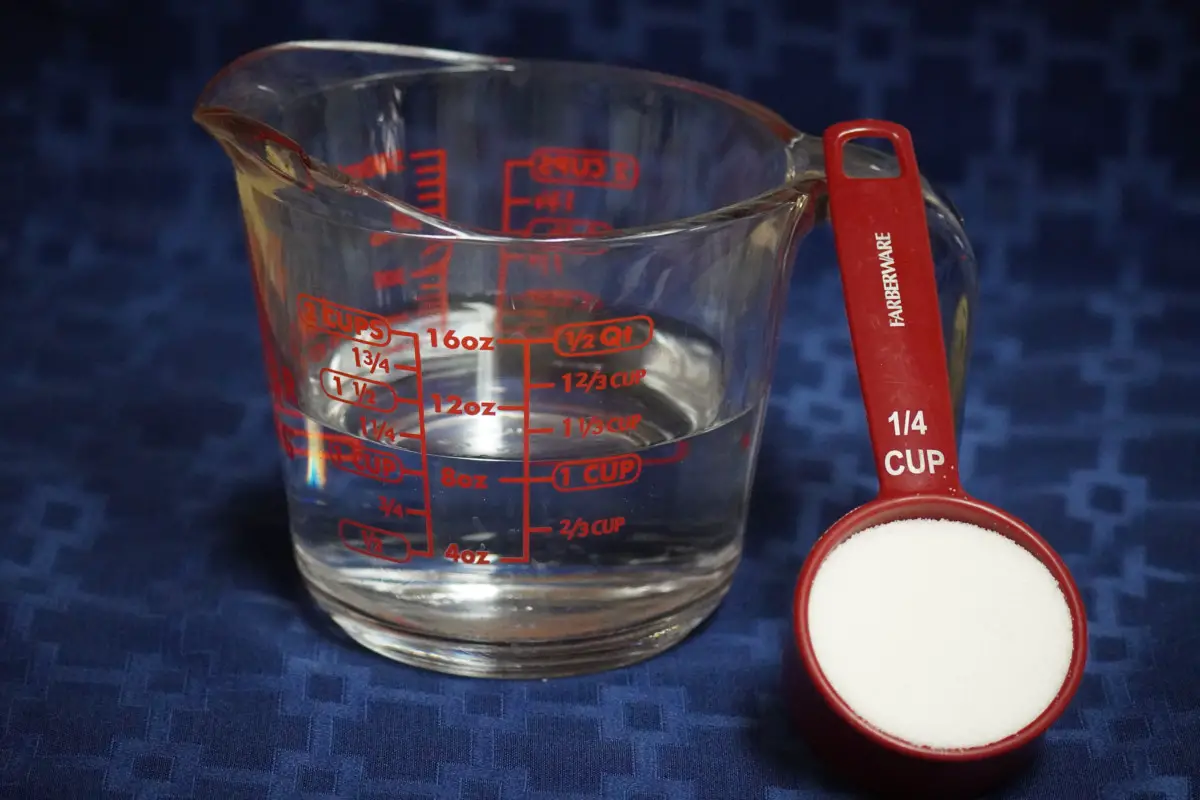
When hummingbirds encounter dirty feeders, they are exposed to harmful bacteria and molds that proliferate in the spoiled sugar water. Such a negative condition not only discourages them from feeding but poses significant health risks.
Read my article: Hummingbird Diseases: From Pathogens to Prevention
The role of hummingbird enthusiasts is to ensure that each feeder remains in pristine condition. Regular cleansing and new sugar water upholds the high standard of food safety for these birds.
Neglecting to clean the feeders results in an unequivocally bad experience for the birds; potentially turning your hummingbird haven into a no-fly zone.
Interestingly enough, hummingbirds, with their discerning tastes, do not preferentially drink from dirty sources, and they will seek out cleaner alternatives if available. So, if you are asking, “Will they drink from dirty feeders?”, the unavoidable truth is that while necessity may force them to, it is certainly not a preferred or safe practice.
Let us consider the hummingbird feeders as they are our tools to serve these flying marvels. Each hummingbird feeder must act as more than a mere food station. It represents a commitment to the health and vitality of the hummingbirds.
Through diligent maintenance of our feeders, replacing nectar recipes frequently, and guaranteeing sugar water free from contaminants, we foster a welcoming and secure feeding ground. Turning a blind eye to the cleanliness of these feeders means neglecting the lifesaving nectar that sustains our backyard visitors.
The question of whether hummingbirds will drink from a dirty feeder is a moot point for the ardent aficionado. We know that our primary obligation is to dispense clean sugar water continuously.
Hummingbirds’ keen survival instincts can sometimes override their preference, driving them to undesirable feeders, but repeatedly exposing these creatures to bad hygiene is neither ethical nor supportive of their long-term survival.
Thus, the answer to an exceptional hummingbird-watching experience does not lie merely in planting a plethora of flowers but in ensuring that every aspect of your offering—from the nectar recipe to the state of your feeders—exemplifies a sanctuary reflective of a deep respect for these avian guests.
Whether you are new to hummingbird feeding or a seasoned pros, it is clear to commit to a routine of sterilizing your hummingbird feeders and providing fresh sugar water as the epitome of best practices in hummingbird care. The joy of seeing a hummingbird dance in the air sipping from a pristine feeder is unmatched and fuels our passion for preserving these remarkable jewels of nature.
From Bad to Clean: The Essential Steps to Ensuring Your Feeders Are Safe for Hummingbird Feeding
When we embark on the delightful journey of hummingbird feeding, the cleanliness of the feeders cannot be overlooked. Hummingbirds are drawn to a colorful feeder, but will they drink from a dirty one? Likely, they will not, as hummers have a natural instinct to avoid potential sources of contamination. Therefore, it is vital to transform feeders from bad to clean regularly, ensuring that these vibrant visitors are privy to the safest dining experience.
Cleaning your feeder does not have to be cumbersome. Use warm water, a bottle brush, and a safe vinegar solution of one part white vinegar with four parts water if necessary. Warm water helps to dissolve old sugar residues and eliminates harmful molds and yeasts that build up in feeders.
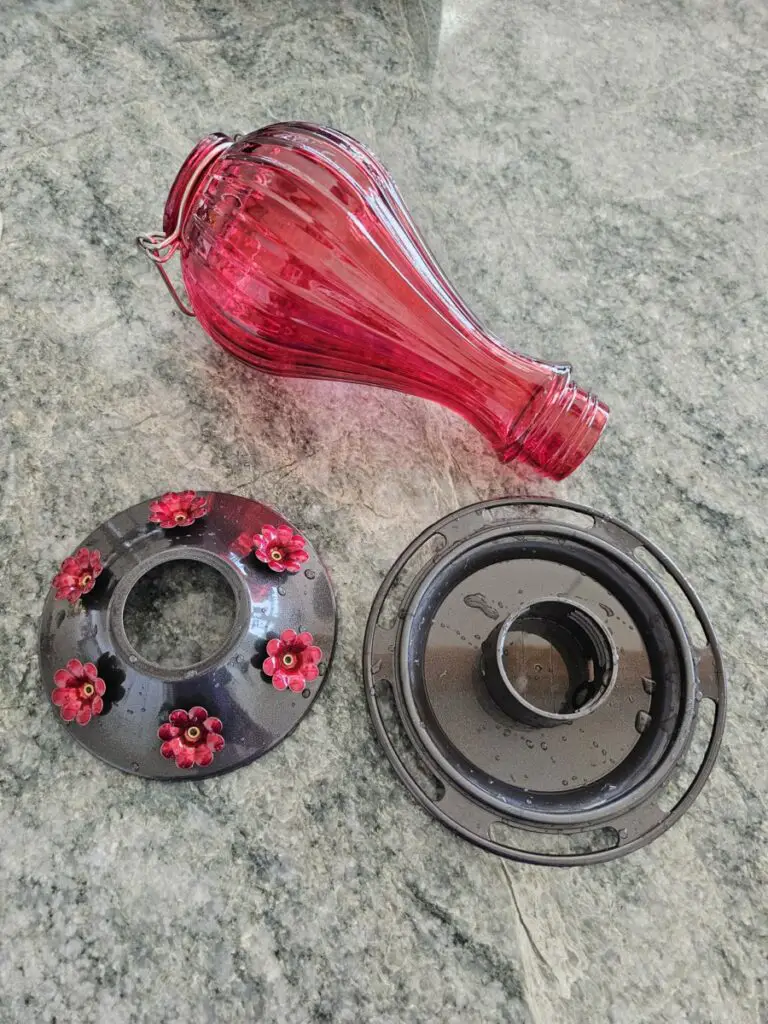
Do not use apple cider vinegar, soap or bleach when cleaning your hummingbird feeder. This simple method is one of the many essential steps in maintaining feeder hygiene.
Ensuring feeders are safe for hummingbird feeding means keeping a diligent schedule. Commit to cleaning your feeder at least twice a week, and more often if the weather is exceptionally warm or if the feeder is heavily trafficked.
This routine prevents food from fermenting, which is detrimental to the health of hummingbirds. Clean feeders will encourage more visits, as hummingbirds prefer fresh food.
It is essential to use fresh sugar water every time you refill your feeder to provide the best possible feed. To mimic natural nectar, use a simple 1:4 ratio of sugar to water without any dyes or additives.
Read my article: Forget Commercial Hummingbird Food, Try Making Homemade Nectar
If your feeder is dirty or bad, hummingbirds will detect the compromised food quality and will look elsewhere, which is an outcome no hummingbird enthusiast wants. The health and safety of the hummingbirds are our number one goal.
A dirty feeder spreads disease among the hummingbird population. Therefore, feeder safety is paramount. The feeders in your garden serve as communal hubs for hummingbirds, which means a single unhealthy feeder impacts many. Adopting clean practices serves not only your regular visitors but your local hummingbirds in the community.

Use a dedicated feeder brush, toothbrush or toothpick for those hard-to-reach areas. Scrubbing the feeding ports is as crucial as cleaning the nectar reservoir since this is where the hummingbirds’ beaks and tongues make frequent contact.
When you have adopted a consistent cleaning regimen, your feeders will stay in top-notch condition, making your garden a reliable haven for these breathtaking creatures.
Ultimately, when asking whether hummingbirds will drink from a dirty feeder, the answer is they can, but they probably will not. It remains our responsibility as admirers of these tiny fliers to do what we can to maintain an environment where they feed safely.
It is an act of respect towards these mesmerizing creatures, delivering them the sustenance they require without the risk of harm.
Let’s roll up our sleeves and ensure our hummingbird feeders are clean and inviting. With these essential steps, we provide a banquet that every hummingbird relishes and returns to day after day. Our hummingbird feeders will be the epitome of pristine, guaranteeing that our vibrant hummers dine with ease and health.
Check out my other posts on Hummingbird Questions
Frequently Asked Questions
Q: Why is cleanliness important for hummingbird feeders?
A: Cleanliness in hummingbird feeders is critical to prevent the spread of bacteria and mold that leads to disease transmission among hummingbirds. Clean feeders ensure that hummingbirds have access to safe and nutritious nectar, making your garden a preferred and safe dining spot.
Q: How often should I clean my hummingbird feeder, and what should I use?
A: Clean your hummingbird feeder at least twice a week, or more frequently in warmer climates or during periods of high usage. Use warm water, a bottle brush, and a safe vinegar solution of one part white vinegar with four parts water if necessary. Always rinse thoroughly to remove any residue. Do not use apple cider vinegar, soap or bleach when cleaning your hummingbird feeder.
Q: Will hummingbirds drink from a dirty feeder?
A: While hummingbirds may drink from a dirty feeder if necessary, they prefer clean sources of nectar and will avoid feeders that are deemed unsafe or unsanitary. A consistently clean feeder encourages them to return and become regular visitors.
Q: Can a dirty hummingbird feeder affect the health of hummingbirds?
A: Dirty feeders harbor harmful pathogens, leading to bacterial and fungal infections which are deadly for hummingbirds. Ensuring your feeder is clean prevents the spread of these diseases and protects the hummingbird population.
Q: What can I do to make my garden more attractive to hummingbirds beyond maintaining clean feeders?
A: In addition to maintaining clean feeders, planting native flowers, shrubs, and trees that attract hummingbirds creates a rich environment for them. Providing natural food sources, nesting sites, and perches makes your garden a comprehensive habitat for these vibrant birds.
Happy Hummingbird Watching!
Backyard Visitors participates in affiliate programs which compensate us for referring traffic.

